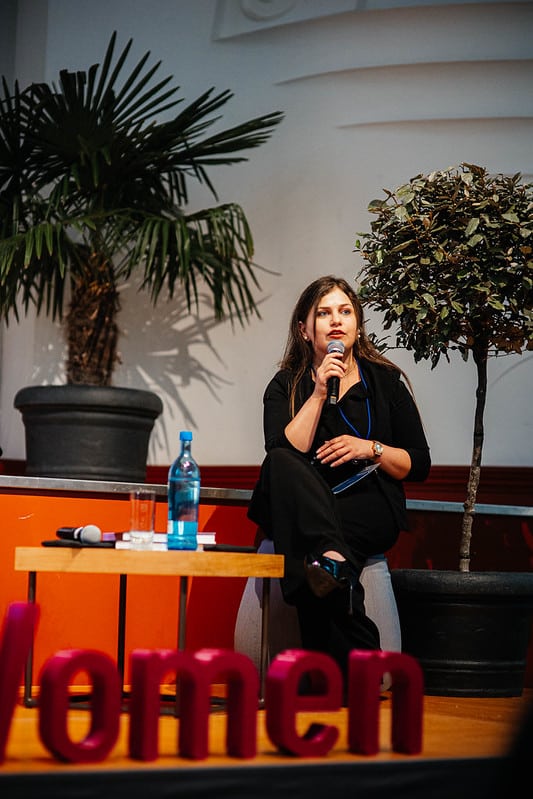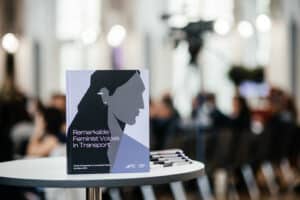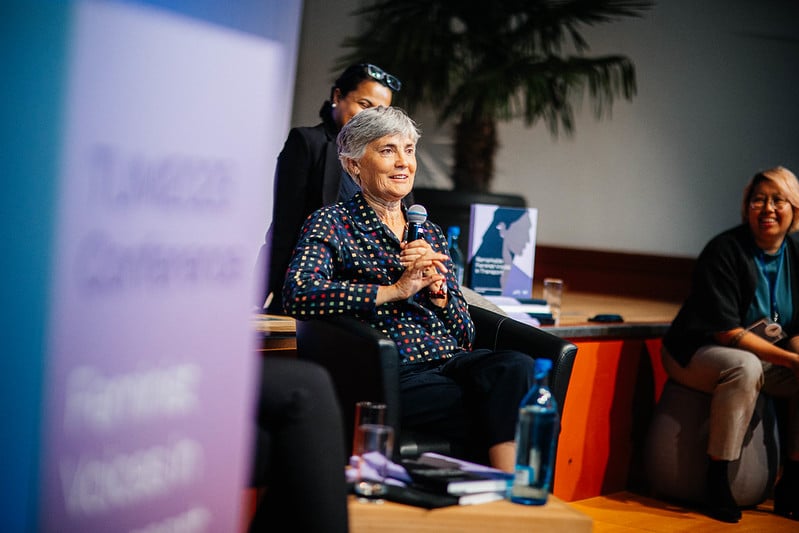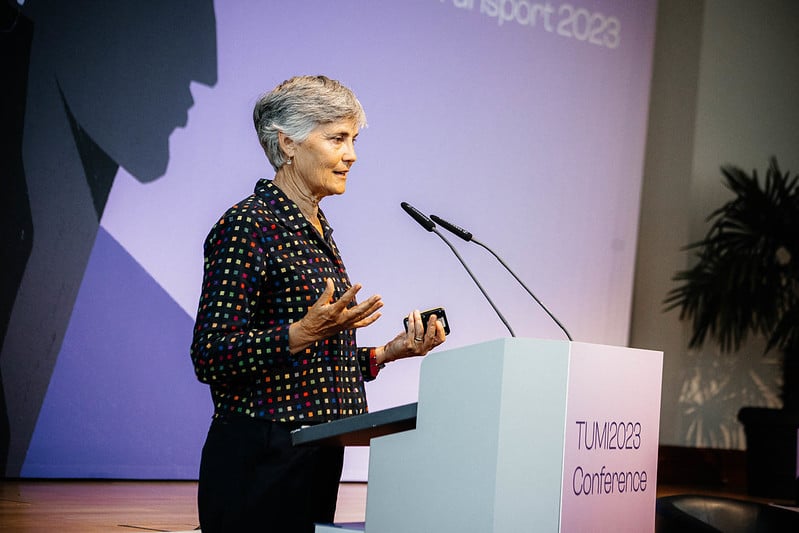What if sustainable mobility could let people of all ages and income levels move around the city autonomously?

What if sustainable mobility could let people of all ages and income levels move around the city autonomously?
In our podcast Talking Transport Transformation (TTT), we interviewed Robin Chase. The mobility entrepreneur, co-founder of Zipcar and founder of NUMO explains her vision of an equitable and sustainable future mobility, speaks about overcoming resistance against new solutions, the responsible use of data, and the role of electric private vehicles. She emphasizes the importance of inviting different perspectives into the discussion. This is one of a series of interviews with the Remarkable Feminist Voices in Transport 2023 who were awarded by TUMI’s Women Mobilize Women initiative. Read the interview here!

Congratulations, you are one of our Remarkable Feminist Voices in Transport 2023! How did you find your voice and was there ever a moment in your career where you faced some adversity but found your voice nonetheless?
I have always been someone who was ready to express my opinion at any moment, so I have rarely felt voiceless. However, when I worked on Zipcar, I really didn’t know a lot about transportation. After I had been CEO for a couple of years, I became a fellow at Harvard and I spent a year educating myself about transportation policy and urban planning policy. That was incredibly important because suddenly I could speak with confidence to policymakers, using the profession’s words.
While I am always ready to speak up and ask questions when I don’t know about things, I now felt much more comfortable in the transport world. I also place importance on listening to others as I am in a constant self-education mode – and sometimes I have to be re-educated!
As women, we have different life experiences and we can talk with more knowledge and confidence about our relevant experiences than men. And whenever we talk about feminism, we also want to think about racism as well.
We have to acknowledge that there are different ways of experiencing the world depending on our gender or on our race. That is why we need to have different voices and inclusion in transportation decision-making and employment.

In the coffee-table book that Women Mobilize Women published about Remarkable Feminist Voices in Transport, you spoke about changing perspectives and making sure that you see beyond your horizon. How do you keep making sure to include these other perspectives?
All of us should be recognizing very clearly that we don’t represent everyone and that we need other people in the room. That should be on our out-of-the-gate checklist for all of us. As I am giving a talk or expressing a strong opinion, I need to think: For whom am I expressing this, who is not included and who else should be sitting here at this table?
I think as women we have all experienced moments where we were taken aback because what someone said does not match our life experience, or because someone is not noticing this entire issue that seems obvious to every woman. So we should reflect that there are others who experience things like transport differently from us, and make sure to pay attention to their voices. We have to be constantly on the lookout for new lessons, even when it comes to topics we think we know inside out.
You are very interested in data-driven solutions for mobility. Would you say that data collection and analysis is a way for us to learn more about other perspectives and take more mobility experiences into account?
Data is a big word that encompasses a lot of complex issues. Demographic data is especially useful so we can learn how people use things, what works and what doesn’t work when people use a system. All of that is so much easier to find, analyze and adjust with data-based approaches. I am a huge believer in data and using it for responsive, quick, and fact-based mobility decisions.
However, there is a flip side to this, particularly in transportation: Every single movement that I make can now be tracked and analyzed on my smartphone. Shared transportation is now a source of data collection, even though it reflects my private movements: We are humans, and we should be able to move independently without people knowing every single one of our movements. There is a very fine balance.
NUMO, the New Urban Mobility Alliance, worked with national associations like NABSA and others to develop privacy principles for mobility data. I think it’s key to only collect the data that you actually need and let people know that you are doing it. Delete it as soon as you don’t need it anymore and be transparent about data collection.
As we move into the future, I am particularly interested in being overt and thoughtful about data. We can correct negative externalities associated with cars based on connectivity and data. For example, we can transition from fuel taxes to distance taxes, apply congestion charging for cars, and offer shared bikes and scooters and public transport as alternatives. I am pro data, and I am pro thinking hard about the correct use of data.
Let’s talk about equitable mobility. Why is mobility such an important factor for equal participation in society?
Equity in transportation is something that many of us think we do for others, but we should also recognize that these gains are also entirely relevant to ourselves at different points in our life cycles: as babies, school children, young adults, elderly. Over the course of our lives, no one mode will ever do the trick for everyone. We need to keep thinking about how to provide mobility for everyone, throughout their lives.
The world now has 8 billion people in it and getting yourself around by car is never going to be the sole answer for these 8 billion people. I don’t think cars are politically or morally correct or incorrect. We require a multimodal set of choices to match the different needs of our dynamic lives.
We should all care about equitable transportation because mobility is the center of our universe. There is absolutely nothing you can do in your life without it – education, working, seeing friends and family, and so on. Transportation is a gateway to life: to opportunity, to health, to fun… So, if we want people to actually live, we need to have higher quality multimodal transportation. And we need to look at it from different life perspectives and stages.

Which solution excites you right now that is affordable and sustainable?
I have been thinking a lot about human rights. We don’t talk about free movement as a human right, and we should. By going down the path of car-centricity and the related infrastructure, we have lost the freedom of free mobility. As car infrastructure has expanded and gained priority over all rights of way, we have lost the possibility of free movement. For example, without a driver’s license or the money to buy a car, we are heavily constrained. We need to reintroduce the now-lost ability to free movement: including walking and biking safely.
Electric micromobility, such as e-bikes, is something I am enamored with. You don’t need a government license to operate it, and it is not expensive when compared to owning a car or building a subway system. Ebikes give people autonomous mobility. People love to move themselves around nimbly and quickly wherever they want to go.
Electric bikes take away excuses like “I have a bad knee”, “I don’t like to sweat”, or “I need to carry my shopping”, plus they tackle the issue of distances and hilly terrain. We know statistically that 50% of all trips are less than 3 miles or 5 kilometers, and 70% of trips are less than 10 or 11 kilometers. We also know that 70% of all car trips are done alone. So, we have this amazing moment where we could shift a large portion of the car-driving population to quality of life, access, joy and mobility with e-bikes.
There are three things we have to do simultaneously to achieve this:
All of these things are cost effective, not that hard to do, and they will help us achieve more equitable and more sustainable transportation.
You have convinced me! But not everyone is as excited as we are about these solutions, what to do about that?
We haven’t even talked about climate change yet, which I would say is my number one issue and then equitable transport the second one. They are 100 percent bound to each other.
I think that solving personal transportation through electric personal cars – which is what many wealthy countries are trying to do – is exactly the wrong solution. This only reduces emissions by one-third because two-thirds come from manufacturing, infrastructure and maintenance. Moving people by personal electric car does not solve equitability in transport. It does not solve congestion. It does not solve parking. It does not solve safety.
Instead, it adds the huge new problem of lithium and cobalt extraction around the world. For example, one SUV battery needs the same resources as 3 Honda Civic electric batteries, 100 golf carts or 225 electric bicycles. Lithium and cobalt are scarce and valuable resources over which we will have conflicts and destroy lands and oceans. So, don’t we want to move 225 people on electric bikes rather than 1 person in an SUV? Yes, we do. We could at this moment make this transition. And I want to repeat that in your different life stages, cars as an option for certain trips will still be present. But they will not be the mode you use for all trips, only for a small share, but they will still be there.
As a CEO, you have faced some strong counterarguments to that. What have you learned from being in rooms where not everyone is convinced that we need a shift in transport?
The way to win an argument is not just by saying “Oh, you are wrong, we need less cars and more bike lanes”. Instead, you have to give a better answer. I invite people to think about their own lives and mobility over the course of their lives. For example, parents would love it if their children could get themselves to sport or to seeing friends safely. Most of us would love not having to drive everywhere, to ride a bike on a beautiful spring day. I am trying to get at things from people’s own self-interest, asking them whether they or their kids have tried an e-bike rather than telling them to sell their car immediately. I think that will go a long way.
One of my epiphanies from the pandemic was that simply offering more choices is not enough. I used to say, as did many people, that if we build it – bike lanes for example – people will use it. Indeed, we have to build bike lanes and better pedestrian and public transit. But, we also have to restrict cars. We have to make sustainable, economical, space-efficient modes better, faster and more convenient than the personal car. So we have to make car infrastructure more miserable. But a good and “fair” way to start is to make cars pay for what they are actually costing society. We need to push cars down as we build up the other modes. That said, it is most appealing to start with “You personally will love it, try it.”

How do we achieve this shift of less cars and more shared and public transport at the same time?
I am a big believer in pilot projects. “We are just experimenting! We will learn and evolve! It is temporary!” This gets a lot less political and public pushback. It is harder to fight a pilot. But once people experience something like improved bike lanes, or better traffic flow (congestion pricing), the majority will see that it is better.
People are always willing to complain about the status quo, like congestion or car and fuel prices, but they are also afraid of change. We all have a hard time envisioning the reality of another life.
As an American visiting European cities that have done a vastly better job of bike lanes, congestion pricing, and the rights of way on streets, I have to say that these changes are unimaginable back home. Demonstration projects are so powerful, and they show us what is possible.
In my own neighborhood, next week, we will have a multi-day block party and eliminate some parking spaces and redirect traffic with hay bales. The goal is for people to say “Wow, we lost four parking spaces, but this was so much better and there was so much less traffic and I talked to my neighbors more, and there is more space for the children to play”. This is my own sneaky demonstration project on my own block. I would prefer to have the city government do projects in a much bigger way, but there is an important role for individual blocks, where there is political will reduce the car dominance in their right of way, to show neighbors and surrounding blocks what is possible. We need to do things faster to act on climate change, inequitable access to transport, and drivers who think the street is theirs when it is not.
You are such a role model, especially for women in transport. Why is it important for you to set an example for women in leadership?
At this stage in my life – I’m 64 – serving as a role model for women in transportation is one of my responsibilities. There are too few women out there talking, so I think we should always say yes to public speaking opportunities.
Role models are important. I hope that that is what I have been doing, But I also want to call out that my own personal role models now are young people in their 30s who are doing amazing things without being jaded or tired.
They are young, early in their careers, and fighting the system in new ways that I have not thought of, with new technology tools I did not have access t. These rising professionals are my role models. I try to listen to them instead of telling them what I know. When I was here at TUMI five years ago, I was so deeply impressed by the lineup of women that came onto the stage. I am really looking forward to being impressed again over the next few days.
You are currently viewing a placeholder content from Podigee. To access the actual content, click the button below. Please note that doing so will share data with third-party providers.
More Information



You are currently viewing a placeholder content from X. To access the actual content, click the button below. Please note that doing so will share data with third-party providers.
More Information